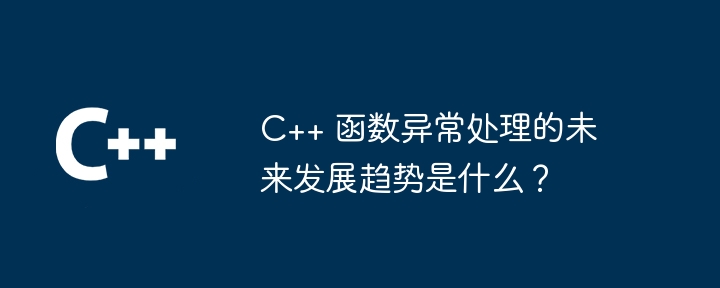Home >Backend Development >C++ >What is the future development trend of C++ function exception handling?
What is the future development trend of C++ function exception handling?
- WBOYWBOYWBOYWBOYWBOYWBOYWBOYWBOYWBOYWBOYWBOYWBOYWBOriginal
- 2024-04-15 21:09:011290browse
Future trends in C function exception handling include: Custom exception types: more flexible and extensible, capable of fine-grained error handling. Improved exception reasoning: The compiler intelligently reasons exception propagation, improving code quality. Coroutines and exceptions: Work together seamlessly to write robust parallel code.

The future development trend of C function exception handling
As software becomes more and more complex, the need for reliable, robust and The need for maintainable code is also growing. Function exception handling (FEH) is an important feature in C that provides a mechanism for handling errors and exceptions. FEH has evolved significantly in recent years and is expected to continue to evolve in the future.
Custom exception types
The C standard library provides many built-in exception types, such as std::bad_alloc and std::out_of_range. However, developers sometimes need to create their own custom exception types to represent application-specific error conditions. In the future, custom exception types will likely be more flexible and extensible, allowing developers to handle errors at a fine-grained level.
Improved exception reasoning
Exception reasoning refers to the compiler's ability to infer whether an expression can throw an exception. Current compilers are weak in this area, making it difficult to identify potential anomalies in the code. In the future, compilers are expected to become smarter and able to accurately reason about exception propagation, helping developers avoid errors and improve code quality.
Coroutines and exceptions
Coroutines are a concurrency primitive introduced in C 20. They allow developers to write collaborative code that can execute alternately without blocking. Currently, the integration of FEH and coroutines is lacking. In the future, it is expected that FEH will be enhanced to work seamlessly with coroutines, allowing developers to write more robust parallel code.
Practical Case
Consider the following code snippet:
void doSomething() {
try {
// ... 可能引发异常的代码 ...
} catch (std::exception& e) {
// 处理异常
}
}In this example, the developer uses a try-catch block to handlestd::exception. In the future, developers can use more specific custom exception types and leverage improved exception reasoning to identify potential anomalies. This will improve code readability, maintainability, and overall reliability.
Conclusion
C function exception handling is an evolving field. In the future, innovations and improvements are expected to continue to meet the growing demands of the software. Custom exception types, improved exception reasoning, and coroutine integration with FEH will be key factors driving this development. By adopting these future trends, developers will be able to write more robust, reliable, and maintainable C code.
The above is the detailed content of What is the future development trend of C++ function exception handling?. For more information, please follow other related articles on the PHP Chinese website!

